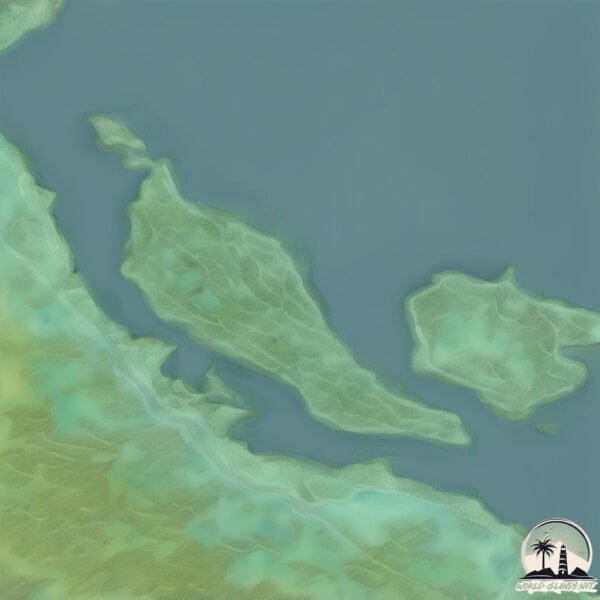Denman

Welcome to Denman, a Temperate island in the The Coastal Waters of Southeast Alaska and British Columbia, part of the majestic Pacific Ocean. This guide offers a comprehensive overview of what makes Denman unique – from its geography and climate to its population, infrastructure, and beyond. Dive into the details:
- Geography and Size: Explore the island’s size and location.
- Climate and Weather: Weather patterns and temperature.
- Topography and Nature: Uncover the natural wonders of the island.
- Infrastructure and Travelling: Insights on reaching, staying, and making the most of your visit.
- News and Headlines: Latest News.
Geography and size of Denman
Size: 53.3 km²
Coastline: 47.2 km
Ocean: Pacific Ocean
Sea: The Coastal Waters of Southeast Alaska and British Columbia
Continent: North America
Denman is a Medium Island spanning 53 km² with a coastline of 47 km.
Archipel: –
Tectonic Plate: North America – Covers North America and parts of the Atlantic and Arctic Oceans, characterized by diverse geological features and varying levels of seismic activity.
The geographic heart of the island is pinpointed at these coordinates:
Latitude: 49.53744407 / Longitude: -124.7824679
Climate and weather of Denman
Climate Zone: Temperate
Climate Details: Warm-Summer Mediterranean Climate
Temperature: Warm Summer
Climate Characteristics: Characterized by warm, dry summers and mild, wet winters, typical of coastal areas with abundant sunshine Rain is more common in the winter months, maintaining a moderate climate.
Topography and nature of Denman
Timezone: UTC-08:00
Timezone places: America/Los_Angeles
Max. Elevation: 107 m
Mean Elevation: 55 m
Vegetation: Evergreen Needleleaf Forest
Tree Coverage: 72%
The mean elevation is 55 m. The highest elevation on the island reaches approximately 107 meters above sea level. The island is characterized by Plains: Flat, low-lying lands characterized by a maximum elevation of up to 200 meters. On islands, plains are typically coastal lowlands or central flat areas.
Dominating Vegetation: Evergreen Needleleaf Forest
Dominated by evergreen coniferous trees such as pines and firs, which retain their needle-like leaves throughout the year. These forests are often found in cooler climates. Denman has a tree cover of 72 %.
Vegetation: 7 vegetation zones – Very Highly Diverse Island
Islands in this range are ecological powerhouses, showcasing a wide array of vegetation zones. Each zone, from lush rainforests to arid scrublands, coastal mangroves to mountainous regions, contributes to a complex and interdependent ecosystem. These islands are often hotspots of biodiversity, supporting numerous species and intricate ecological processes.
Infrastructure and Travelling to Denman
Does the island have a public airport? no.
There is no public and scheduled airport on Denman. The nearest airport is Comox Seaplane Base, located 12 km away.
Does the island have a major port? no.
There are no major ports on Denman. The closest major port is COMOX HARBOR, approximately 10 km away.
The mean population of Denman is 21 per km². Denman is Gently Populated. The island belongs to Canada.
The name of the island resonates across different cultures and languages. Here is how it is known around the world: Arabic: جزيرة فانكوفر; German: Vancouver Island; Spanish: Isla de Vancouver; French: île de Vancouver; Portuguese: Ilha Vancouver; Russian: Ванкувер; Chinese: 溫哥華島
Continuing your journey, Hornby is the next notable island, situated merely km away.
Denman Island BC Travel Guide (2025) | Beaches, Hiking, Camping & Local Tips



Canada is classified as Developed region: G7: Group of Seven – Major advanced economies, including Canada, France, Germany, Italy, Japan, the United Kingdom, and the United States. The level of income is High income: OECD.
News – Latest Updates and Headlines from Denman
Stay informed with the most recent news and important headlines from Denman. Here’s a roundup of the latest developments.
Please note: The data used here has been primarily extracted from satellite readings. Deviations from exact values may occur, particularly regarding the height of elevations and population density. Land area and coastline measurements refer to average values at mean high tide.
